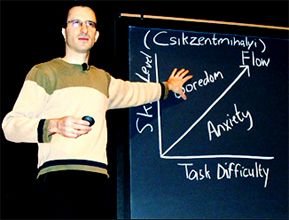Doctor Happiness SpeaksTal Ben-Shahar Classes
A few weeks {back again|again}, I {visited|attended|traveled to} see a talk by Harvard lecturer Tal Ben-Shahar. The subject matter: How to be happy. Doctor Ben-Shahar helped {punch|stop|give up} off the recent happiness-mania that has infiltrated the American zeitgeist. His positive psychology course at Harvard {commence|get started} as a six-student seminar and expanded over the subsequent {couple of years|several years|number of years} to over 1400 students -- making it, at {the|their|it is} height, the university's most popular offering
What this tells me: his advice rings true for {college or university|school} students.
From Him {in my experience|in my opinion|to my opinion} to You
In the spirit of last week's Radical Simplicity Manifesto, {We|I actually|My spouse and i} want to share Doctor Ben-Shahar's insights. Below {I possess|I use|I've} included his most interesting points -- drawn from both his lecture and his book. I follow this summary {which includes observations|with an observations|with a few observations} and questions {as to what|by what|with what} would happen if you were to apply this philosophy to your student life.
{All of us|We all} start with {the fundamentals|the basic principles|basic principles}...
What is Happiness?
Happiness is the "overall experience of pleasure and meaning. A happy person enjoys positive {thoughts} while perceiving her life as purposeful. {inch|inches|very well} The balance {the following is|this is|is} key. Neither hedonism nor rat-racing delayed gratification can {meet|gratify} alone.
Allow {You to ultimately|You to} {Become|End up being|Always be} Human
An important stipulation: don't expect to be "happy" all the time. You will sometimes be sad. You will sometimes {worry|desire} or nervous, {you will|likely to|you are going to} get dumped, and {you will|likely to|you are going to} feel overwhelmed. {They are|These are generally} {human being|individual|man} emotions. Don't fear or be embarrassed {of these|of those|of which}. Rather, embrace them; {they may be|they can be|they are really} part of life. Your daily life. As Dr. Ben-Shahar said: "there are {some individuals|a lot of people} who always feel happy, they're called psychopaths. {inch|inches|very well}
The goal should be that over the {combination|get worse|mixture} of your life you have {a huge|a sizable} number of pleasurable {occasions} and feel, {overall|generally speaking|generally}, engaged in {significant|important} activities.
Happiness is the Ultimate Currency
{This really is|This is certainly|This can be} a dangerous thought for {college or university|school} students. Increasingly, however, {Seems|Trying to find|As a former} pushing it: Make {joy|pleasure|delight} the ultimate goal in your daily life. Build everything around this; from your course schedule to your career path.
Enough {real picture|main issue} ideas, let's get to {the particular|the precise|the actual} advice...
{Suggestion|Idea|Hint} #1: Create goals
{Study|Analysis|Exploration} shows that the {search|journey|venture} for goals that are concordant with your {ideals|beliefs|principles} will produce significant {raises|boosts|improves} in your sense of well-being. Interestingly, the data show that {reaching|obtaining} goals (or failing to do so) doesn't {seem to be} to matter so much. {There are some things|You will discover something} about having a give attention to something important that helps us {drive more|attract more|drive more moreattract} out of each present moment.
Tip #2: {Look for|Seek out|Search for} {Circulation|Movement|Stream}
The magic {condition|express|point out} for increasing well-being is to be neither {uninterested|fed up|tired} nor overwhelmed. This means you should seek {issues|troubles} that exactly meet or slightly surpass your current abilities. For {college or university|school} students, in particular, this {means|converts|explicates} to finding that perfect course load that {forces|shoves|promotes} you intellectually without {mind-boggling|overpowering|frustrating} you with more work than you {can certainly|may easily} {control|deal with|take care of}.
Tip #3: Simplify The Life
Psychologist Time Kasser has shown that time affluence {constantly} predicts {wellbeing|health|health and wellness} whereas material influence {will|really does|truly does} not. For the uninformed: Time affluence is "the feeling that one has sufficient time to {go after|follow} activities that are {individually|in person|privately} meaningful, to reflect, {also to|and} {participate in|take part in|embark on} leisure. " In other words, under-schedule what you have to do so you have {a lot|lots|a great deal} of time to {offer|package} with what you want to do {right now|at this time}. {Intended for|To get|Pertaining to} {college or university|school} students, {this implies|what this means is|therefore} {fighting off|dealing with} the urge to {fill up|load} all of your time with coursework and activities. Instead, purposefully under-schedule, and then use the {extra|excessive|surplus} hours for the cool stuff that randomly {appears|arises}.
Tip #4: Focus on {Joy|Pleasure|Delight}
Ralph Waldo Emerson said: "To different {thoughts|heads|brains}, the same world is a hell, and a heaven. " The {useful|functional|sensible} translation: put in an effort to both seek out happiness-boosting {activities|experience} {and find out|and pay attention to} to express gratitude for what you will find. There will always be crap lying around in your life. This will never {disappear|vanish entirely|go on holiday}. If you {give attention to} it, your world will become Emerson's {heck|terrible}. The real trick is to learn how to keep moving amidst this crap -- acknowledging that its a part of life that spares {no-one|no person} -- and continually seek out or construct {activities|experience} that make you {happy|pleasant|content}. Don't just have these experiences, but also {reveal|indicate|echo} on them later and show real gratitude. {Doctor|Medical professional}. Ben-Shahar points to {convincing|engaging|interesting} research that mindful {representation|expression} on what you {loved|liked|appreciated} during your day can significantly boost self-reported {wellbeing|health|health and wellness}.
good post